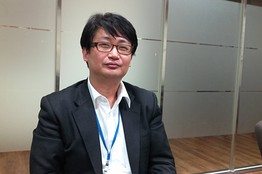Press Release
Why is a South Korean businessman/professor with no political experience and who has articulated virtually no policy positions leading the presidential race with just over a month to go?
|
The Wall Street Journal Jeong Han-wool, director of public opinion research at the East Asia Institute in Seoul |
Jeong Han-wool, director of public opinion research at the East Asia Institute in Seoul, says it’s because South Koreans are shifting away from identifying themselves as party-affiliated voters. Mr. Jeong wrote his doctoral thesis on the phenomenon.
He said the shift can largely be found with voters who in the 1990s would have identified themselves as liberal. These voters supported Kim Dae-jung in 1998 and Roh Moo-hyun in 2002. But in 2007, about 30% of those voters peeled away from the liberal Democratic Party (later renamed as the Democratic United Party) and supported conservative Lee Myung-bak for president, motivated largely by the perception that he’d handle the economy better than Messrs. Kim and Roh.
“Recently, these voters have become more complex,” Mr. Jeong said, citing research he did during his graduate school work and at the independent institute. “They feel negatively about the polarized ideologies of the left and right. They’ll take different attitudes from the party lines, expressing liberal views on the economy and conservative ones on national defense, for example.”
The bottom line, he said, “Because the current political parties don’t represent what they want, they are open to others.”
But the new political middle that is developing in South Korea may not be big enough to support Mr. Ahn (or any other independent) into office. Mr. Ahn’s doppelganger in the Seoul mayoral race last year, Park Won-soon, won in part because the Democratic United Party didn’t field a candidate and liberal voters supported Mr. Park. He later joined the DUP.
Mr. Ahn may be discovering the same thing. On Tuesday, he met with Moon Jae-in, the DUP’s presidential nominee, for the first of what observers think will be several meetings to decide whether and how to unite their campaigns.
